Unit 6 Birdwatching Grammar2 课件
文档属性
| 名称 | Unit 6 Birdwatching Grammar2 课件 | 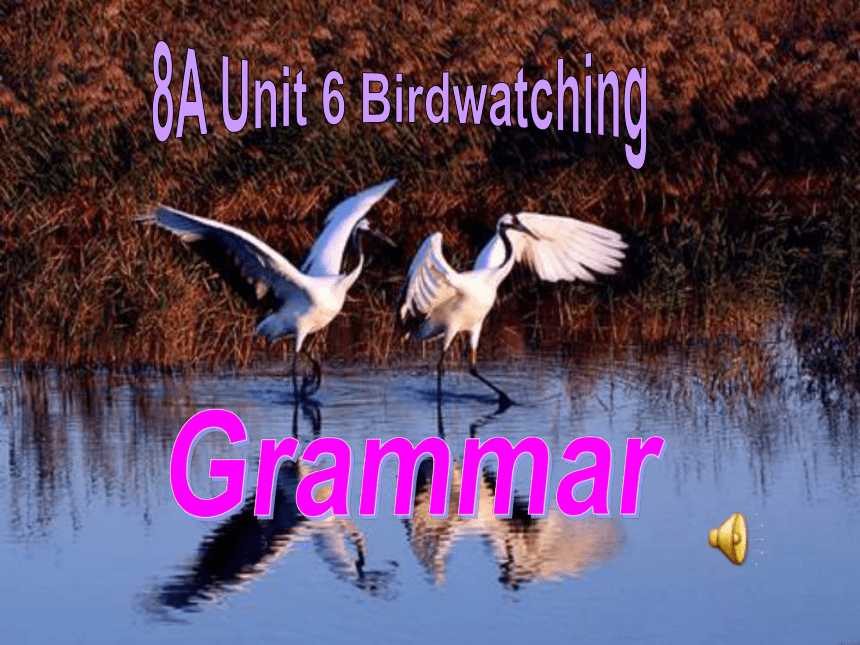 | |
| 格式 | zip | ||
| 文件大小 | 814.5KB | ||
| 资源类型 | 教案 | ||
| 版本资源 | 牛津译林版 | ||
| 科目 | 英语 | ||
| 更新时间 | 2014-12-05 17:47:10 | ||
图片预览

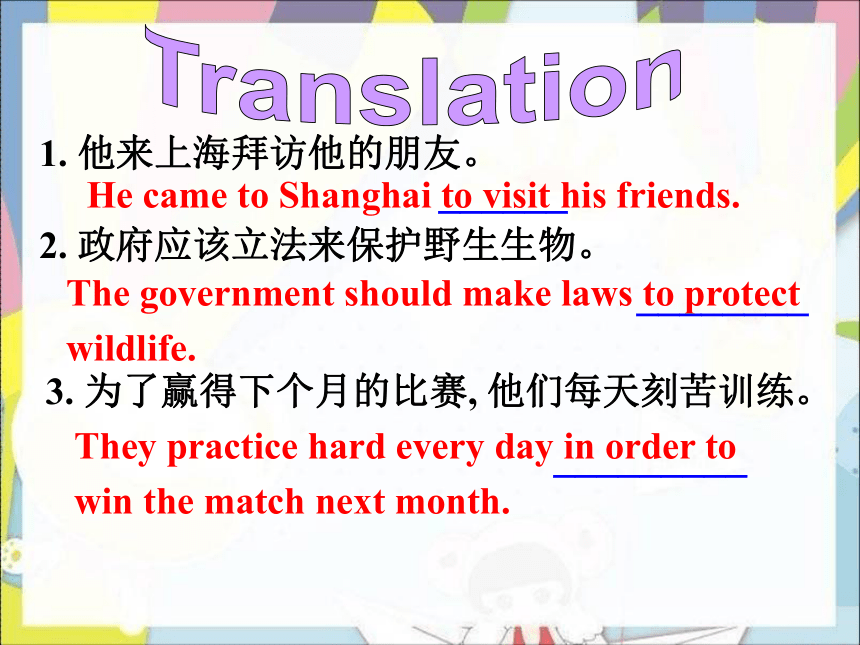
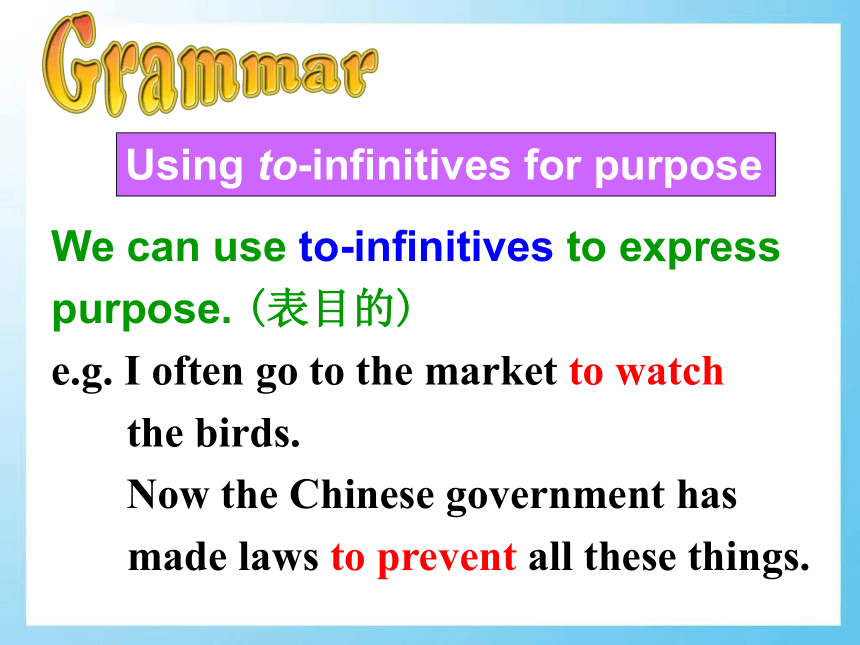
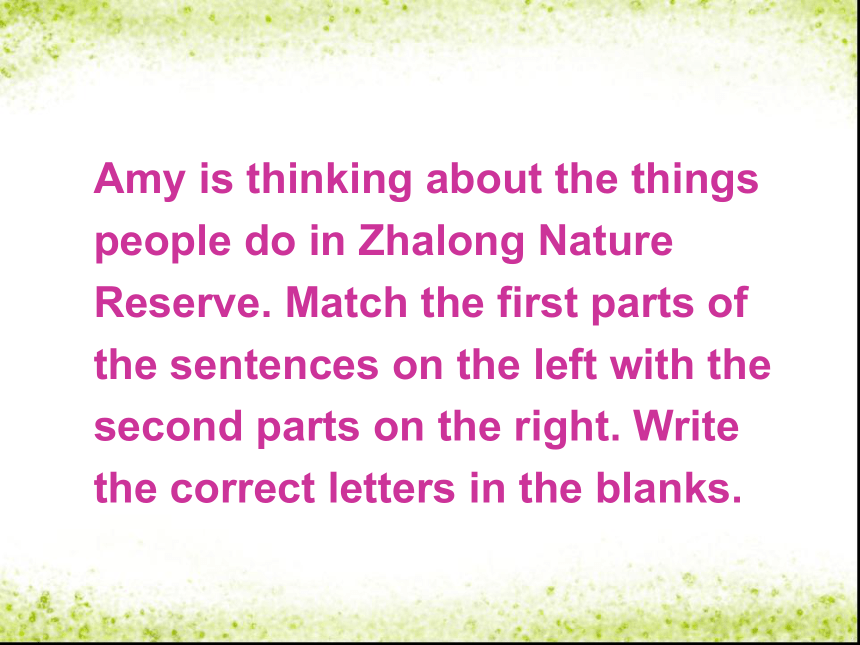
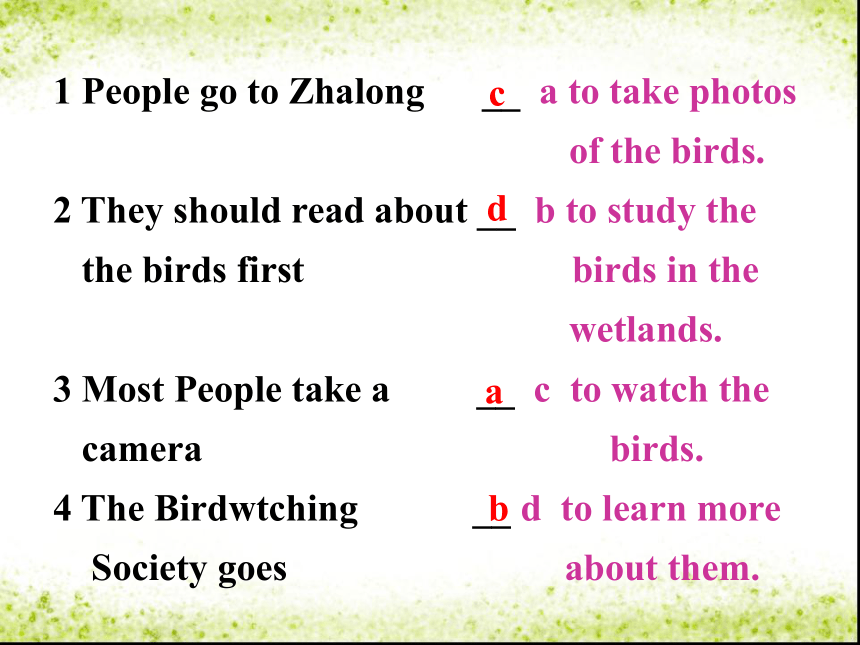
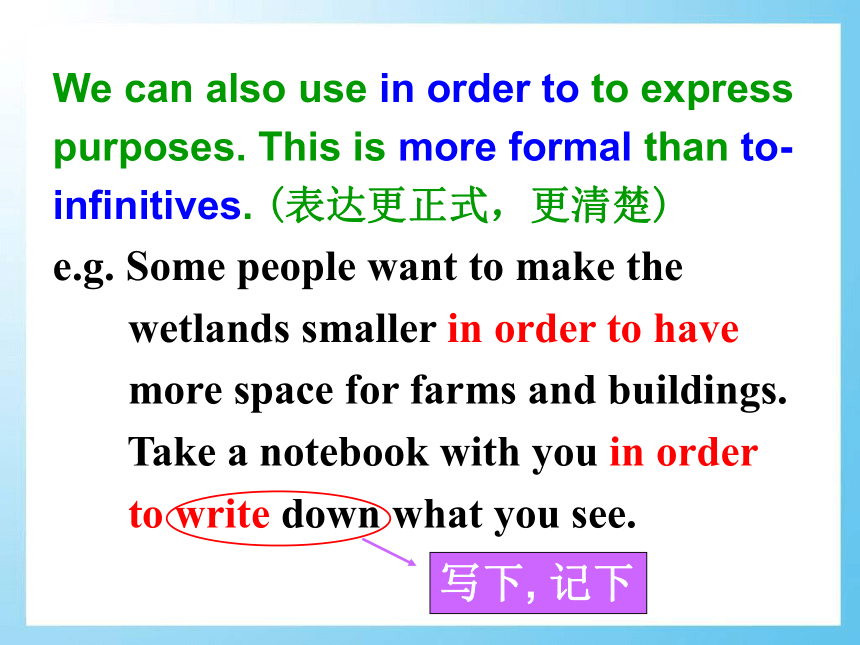
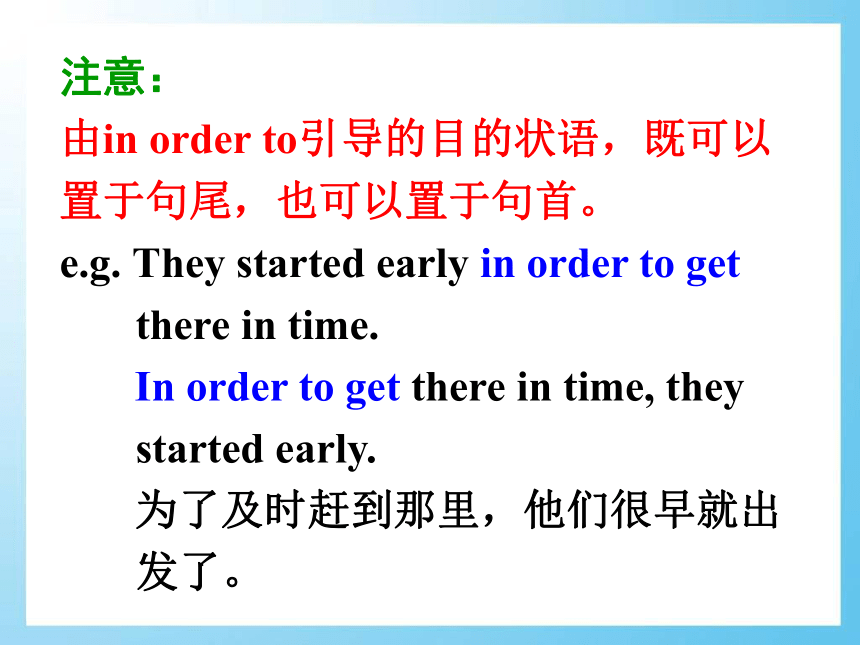
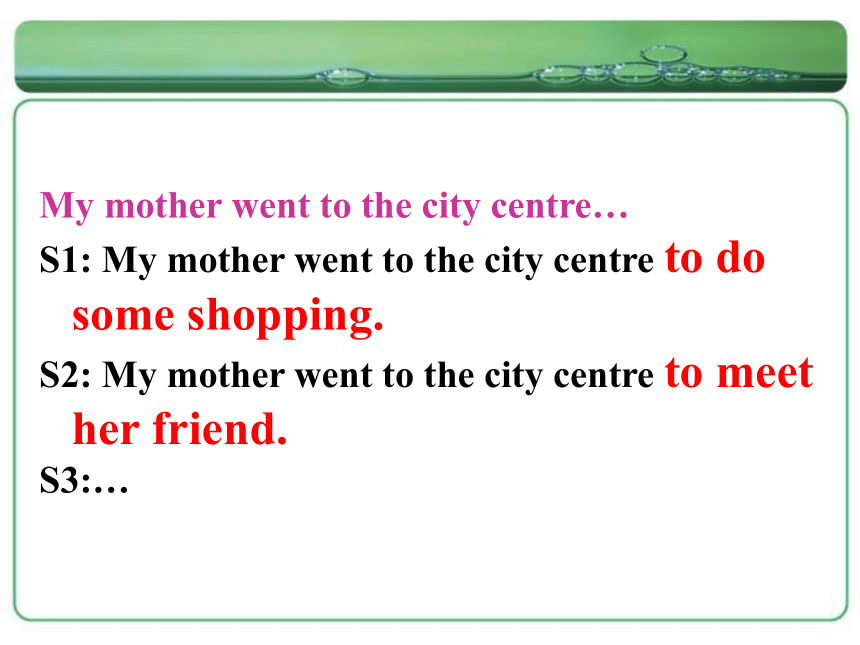
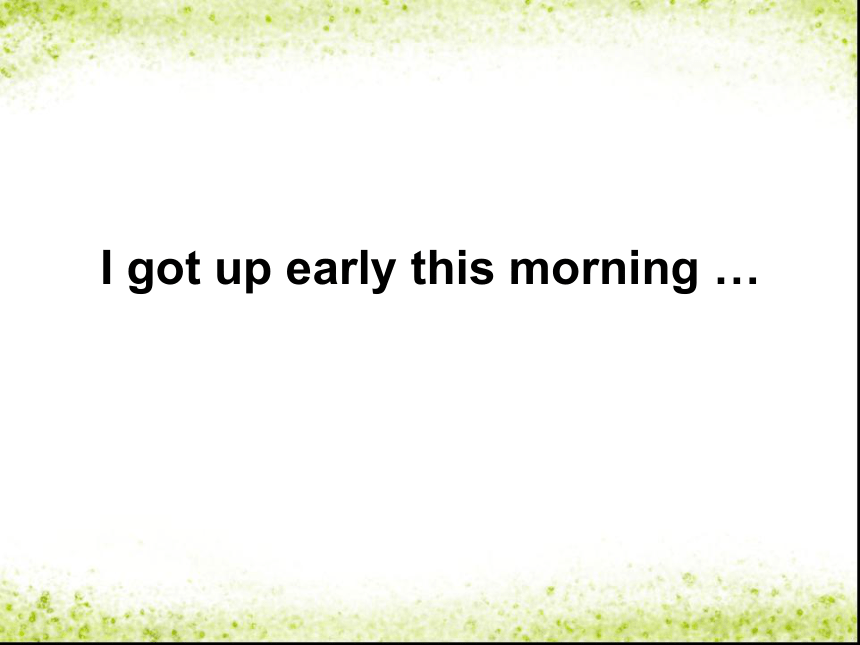
文档简介
课件25张PPT。Grammar8A Unit 6 Birdwatching1. 他来上海拜访他的朋友。
2. 政府应该立法来保护野生生物。He came to Shanghai to visit his friends.The government should make laws to protect wildlife.______________Translation3. 为了赢得下个月的比赛, 他们每天刻苦训练。They practice hard every day in order to win the match next month._________Using to-infinitives for purposeWe can use to-infinitives to express
purpose. (表目的)
e.g. I often go to the market to watch
the birds.
Now the Chinese government has
made laws to prevent all these things.Amy is thinking about the things people do in Zhalong Nature Reserve. Match the first parts of the sentences on the left with the second parts on the right. Write the correct letters in the blanks.1 People go to Zhalong __ a to take photos
of the birds.
2 They should read about __ b to study the
the birds first birds in the
wetlands.
3 Most People take a __ c to watch the
camera zxxk birds.
4 The Birdwtching __ d to learn more
Society goes about them.adbcWe can also use in order to to express purposes. This is more formal than to-infinitives. (表达更正式,更清楚)
e.g. Some people want to make the
wetlands smaller in order to have
more space for farms and buildings.
Take a notebook with you in order
to write down what you see.写下, 记下注意:
由in order to引导的目的状语,既可以
置于句尾,也可以置于句首。
e.g. They started early in order to get there in time.
In order to get there in time, they started early.
为了及时赶到那里,他们很早就出发了。
My mother went to the city centre…
S1: My mother went to the city centre to do some shopping.
S2: My mother went to the city centre to meet her friend.
S3:…I got up early this morning …To learn to use to-infinitives for purpose
To learn to use verbs + objects + to-infinitivesUsing verbs + objects + to-infinitivesWe can use some verbs with objects
and to-infinitives. (动词不定式在句中作宾语补足语)
e.g. We are now inviting them to help us.
We need more people to count and
describe the birds.We add not before to-infinitives to
express a negative meaning.
e.g. We ask people not to catch birds for
any reason.常跟带to的动词不定式作宾语补足语的动词有:ask, tell, order, invite, get, allow, wish, want, encourage, advise, warn, like, love, hate等。动词不定式作宾语补足语,有带to和不带to的两种形式。e.g.
The policeman told the boys not to swim in the river.
The teacher asked the students to finish the homework on time.make or let + object + infinitive without to
e.g. Max tells funny jokes and often
makes me laugh.
Mr Wu agreed to let me join their
school trip.常跟不带to的动词不定式
作宾语补足语的动词有:感官动词hear, feel, see, watch, notice等;使役动词let, make和have。 notice listen to hear watch 五看 see look at observe三使 let make have 二听一感觉: feel+ sb. do sth.
(不带to)see or hear + object + infinitive without to
e.g. She saw a baby panda drink her
mother’s milk.
Millie and Amy heard someone sing
in the park.动词help后面的动词不定式可带to, 也可不带to。help + object + infinitive with or without to
e.g. This will help people (to) understand
the importance of the wetlands.
She often helps me (to) do the
housework.The Class 1, Grade 8 students went to Zhalong Nature Reserve. Sandy is writing about their trip. Help her complete the sentences with the correct forms of the verbs in brackets.Going birdwatching1. Mr Wu _____ us ________ a pair of comfortable shoes because we would have to walk a long way. (ask/wear)
2. We ______ some birds _____ in the trees. (hear/sing)
3. Mr Wu _____ us _________ the birds carefully. (tell/watch)
4. He also __________ us __________ the birds. (encourage/describe)asked to wearheard singtold to watchencouraged to describe 5. He _______ us __________ in the wetlands. (advise/not shout)
6. The cold weather _______ some birds ______ south for the winter. (make/fly)
7. The trip _______ us ______ more about wildlife. (help/learn)madehelped learnflyadvised not to shout1. 我父亲经常鼓励我努力学习。
My father often encourages me to study hard.
2. 去年李老师教我们打篮球。
Mr Li taught us to play basketball last year.Exercises3. 语文老师让我们抄写这篇文章两遍。
The Chinese teacher made us copy the article twice.
5. 为了通过期末考试, 我们必须更努力学习。
We must study harder in order to pass the final exams.Recite the related phrases with to-infinitives.
2. 政府应该立法来保护野生生物。He came to Shanghai to visit his friends.The government should make laws to protect wildlife.______________Translation3. 为了赢得下个月的比赛, 他们每天刻苦训练。They practice hard every day in order to win the match next month._________Using to-infinitives for purposeWe can use to-infinitives to express
purpose. (表目的)
e.g. I often go to the market to watch
the birds.
Now the Chinese government has
made laws to prevent all these things.Amy is thinking about the things people do in Zhalong Nature Reserve. Match the first parts of the sentences on the left with the second parts on the right. Write the correct letters in the blanks.1 People go to Zhalong __ a to take photos
of the birds.
2 They should read about __ b to study the
the birds first birds in the
wetlands.
3 Most People take a __ c to watch the
camera zxxk birds.
4 The Birdwtching __ d to learn more
Society goes about them.adbcWe can also use in order to to express purposes. This is more formal than to-infinitives. (表达更正式,更清楚)
e.g. Some people want to make the
wetlands smaller in order to have
more space for farms and buildings.
Take a notebook with you in order
to write down what you see.写下, 记下注意:
由in order to引导的目的状语,既可以
置于句尾,也可以置于句首。
e.g. They started early in order to get there in time.
In order to get there in time, they started early.
为了及时赶到那里,他们很早就出发了。
My mother went to the city centre…
S1: My mother went to the city centre to do some shopping.
S2: My mother went to the city centre to meet her friend.
S3:…I got up early this morning …To learn to use to-infinitives for purpose
To learn to use verbs + objects + to-infinitivesUsing verbs + objects + to-infinitivesWe can use some verbs with objects
and to-infinitives. (动词不定式在句中作宾语补足语)
e.g. We are now inviting them to help us.
We need more people to count and
describe the birds.We add not before to-infinitives to
express a negative meaning.
e.g. We ask people not to catch birds for
any reason.常跟带to的动词不定式作宾语补足语的动词有:ask, tell, order, invite, get, allow, wish, want, encourage, advise, warn, like, love, hate等。动词不定式作宾语补足语,有带to和不带to的两种形式。e.g.
The policeman told the boys not to swim in the river.
The teacher asked the students to finish the homework on time.make or let + object + infinitive without to
e.g. Max tells funny jokes and often
makes me laugh.
Mr Wu agreed to let me join their
school trip.常跟不带to的动词不定式
作宾语补足语的动词有:感官动词hear, feel, see, watch, notice等;使役动词let, make和have。 notice listen to hear watch 五看 see look at observe三使 let make have 二听一感觉: feel+ sb. do sth.
(不带to)see or hear + object + infinitive without to
e.g. She saw a baby panda drink her
mother’s milk.
Millie and Amy heard someone sing
in the park.动词help后面的动词不定式可带to, 也可不带to。help + object + infinitive with or without to
e.g. This will help people (to) understand
the importance of the wetlands.
She often helps me (to) do the
housework.The Class 1, Grade 8 students went to Zhalong Nature Reserve. Sandy is writing about their trip. Help her complete the sentences with the correct forms of the verbs in brackets.Going birdwatching1. Mr Wu _____ us ________ a pair of comfortable shoes because we would have to walk a long way. (ask/wear)
2. We ______ some birds _____ in the trees. (hear/sing)
3. Mr Wu _____ us _________ the birds carefully. (tell/watch)
4. He also __________ us __________ the birds. (encourage/describe)asked to wearheard singtold to watchencouraged to describe 5. He _______ us __________ in the wetlands. (advise/not shout)
6. The cold weather _______ some birds ______ south for the winter. (make/fly)
7. The trip _______ us ______ more about wildlife. (help/learn)madehelped learnflyadvised not to shout1. 我父亲经常鼓励我努力学习。
My father often encourages me to study hard.
2. 去年李老师教我们打篮球。
Mr Li taught us to play basketball last year.Exercises3. 语文老师让我们抄写这篇文章两遍。
The Chinese teacher made us copy the article twice.
5. 为了通过期末考试, 我们必须更努力学习。
We must study harder in order to pass the final exams.Recite the related phrases with to-infinitives.
